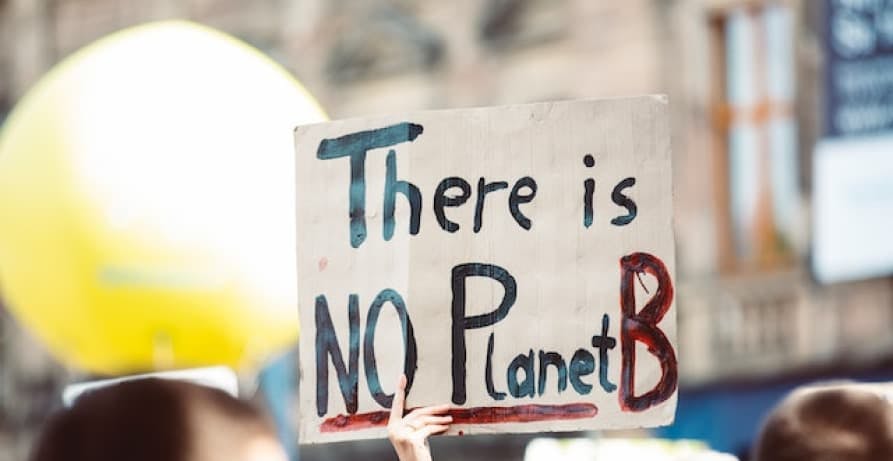ESG / CSR
Industries
What is the Climate Bill and What Does it Imply?



- How the U.S. climate bill was developed
- Its effectiveness in mitigating climate change
- How the bill will achieve its primary environmental and policy objectives
One change of heart can change the world, and that’s exactly what just happened with the new climate bill in the U.S. – otherwise known as the Inflation Reduction Act of 2022, which was developed in order to help reduce energy costs, encourage the use of electric vehicles, facilitate the energy transition, and mitigate the current climate crisis in the United States.
This historic climate bill, which was passed in August 2022, will devote nearly $369 billion USD to clean energy programs in order for the U.S. to develop self-sufficiency in the energy sector – and keep up with their, “powerhouse” title.
What does this new climate bill mean for the future of energy use, and ultimately – climate change?
In this article, we'll break down how the Inflation Reduction Act serves as a pivotal piece of climate legislation dedicated toward prioritising environmental justice, the development of improved energy infrastructure, and the clean energy transition.
What is the New Climate Bill?
The new climate bill, also known as the Inflation Reduction Agreement 2022, is a federal law designated to help the U.S. government reduce the price of prescription drugs and invest in clean, domestic energy production.
How was the Climate Bill Initially Developed?
Biden originally proposed a plan to establish new, more stringent climate measures called the, “Build Back Better” bill. This original bill was supposed to provide $555 billion USD to various climate programs. The new bill recently signed, called, “Inflation Reduction Agreement 2022” offers less money, totaling at 369 billion dollars, to tackle climate change – but still remains the most funding a climate bill has ever received in the U.S.
The battle cards below will further depict the differences between Biden's "Build Back Better" bill and the Inflation Reduction Act of 2022:
How Will This New Climate Law Aid in the Clean Energy Transition?
The Inflation Reduction Agreement 2022 has multiple climate goals in mind, such as by incentivising companies to utilise renewable energy and encouraging households to purchase energy efficient equipment.
Here's a breakdown of some of the ways that the climate bill will help to support clean energy initiatives:
- Methane Penalty: The new climate bill strives to promote methane penalty, with a $900 fee for exceeding the federal limit through 2024 – and an increased fee of $1,500 by 2026.
- Tax Credits: There will be tax credits for those who implement carbon capture and storage systems into their business models.
- Fund Clean Energy Development: The new climate bill also allocates funding for various renewable energy sources like solar panels and wind turbines, with tax credits included as well. There will be funding for ‘green banks’ to promote clean energy projects in struggling communities, and to reduce emissions in agriculture. The climate bill allows Americans to qualify for a rebate if they remodel their homes to include more energy efficient appliances.
- Improved Infrastructure: $60 billion USD from the new climate bill will go towards communities that require financial aid to improve their commitment to net-zero emissions and transportation infrastructure to prevent pollution.
- Encourage EVs: Car manufacturing companies that seek to produce electric vehicles and renewable energy technologies will also receive tax credits, and Americans who purchase vehicles that use clean energy will receive tax credits as well.
As stated previously, this new climate bill is revolutionary – as it will support both lower energy costs and encourage low income households to contribute in the fight against climate change.

What Were Biden’s Environmental Goals?
Biden made clear during his presidential campaign that he was serious about making sure the United States complies with the measures necessary to reduce climate change – even citing that the country was under a national emergency with global warming.
A Breakdown: Biden's Environmental Goals
Most notably, Biden wanted to make the climate change crisis known and allow the U.S. to lead as a global example. Predominantly, his main goal was to have Americans strive to use renewable energy and reach net-zero emissions by 2050.
More specifically, Biden has five key environmental goals he will attempt to achieve during his time in office. For instance, he wants the U.S. to become a clean energy economy and join the movement to reach net-zero emissions by 2050.
The drop down sections below will breakdown of those five environmental goals developed by Biden:
⚡ 100% Carbon-Free Electricity by 2030
The goal is to power all federal operations using carbon pollution-free electricity, including 50% that is locally supplied and available 24/7.
🚗 Zero-Emission Vehicle Acquisitions by 2035
All federal vehicles will transition to zero-emission models by 2035, starting with 100% light-duty purchases by 2027.
🏢 Net-Zero Emissions from Federal Buildings by 2045
The plan targets a 50% reduction in building emissions by 2032 and full net-zero status for federal buildings by 2045.
🛒 Net-Zero Emissions from Federal Procurement by 2050
Agencies will collaborate with vendors and suppliers to ensure net-zero emissions across all procurement activities by mid-century.
🌎 Climate-Resilient Infrastructure & Operations
Federal operations will integrate climate adaptation and resilience to minimise vulnerability to extreme weather and environmental disruption.
Additional Goals Under the New Law Developed by Biden
1. Invest in Climate Resilience
On his first day in office, Biden signed executive orders that exceed what the Obama administration had in place for mitigating climate change. Biden planned to oversee the progress of these newly signed executive orders by the end of his first term, and continued to invest in the tools needed to fight climate change where necessary – especially in communities most affected by the devastating effects of global warming, like developing countries or places where natural disasters have occurred.
2. Unify the U.S. in the Fight Against Climate Change
Biden wants the U.S. to become more unified in the fight against climate change. He is aiming to revamp the investments made towards infrastructure to improve sustainability in water, transportation, and energy so that all these sectors can be more resilient for the future negative effects of climate change to come.
3. Bring Awareness to the Danger of Climate Change
The United States is known for being a powerhouse region of the world, and with this label in mind – Biden wants to encourage the entire world to recognise the danger of climate change. Biden demonstrated this by re-joining the Paris Climate Agreement, and aims to continue advocating for the importance of climate change by implementing climate change into the country’s foreign policy.
4. Support Developing Communities
Developing countries and low income communities suffer from the effects of climate change the most, due to a lack of resources and finances to course correct those negative impacts. Therefore, Biden aims to help communities like these prioritise their health in the midst of extreme pollution.
5. Protect the Economy
Biden recognises that the economy can’t be disregarded in conjunction with the efforts to improve the state of climate change. As a result, he will ensure that those who contributed to the industrial revolution remain employed – even if the circumstances of their work are subject to change in order to mitigate further carbon dioxide or greenhouse gas emissions.

What Does the New Climate Bill Imply?
Given the record amount of funds allocated to this new climate bill, otherwise known as the Inflation Reduction Agreement 2022 – positioning the United States to lead global efforts in addressing climate challenges.
According to the Environmental Protection Program, climate investments on behalf of the IRA are projected to reduce U.S. greenhouse gas emissions 40% below 2005 levels by 2030.
In other words, this new climate bill insinuates that the United States and the Biden administration are ready to use their exceptional financial resources to not only reduce their own global impact, but to help others less fortunate around the globe reduce their carbon footprint and improve upon energy efficiency.
According to the American Petroleum Institute, the U.S. is responsible for approximately 11% of global methane emissions. As a whole, the U.S. remains as the second largest emitting country due to the extensive use of methane emissions caused by oil, gas, and pipeline production – of which is only bound to increase under Trump's return to office.
Ultimately, by imposing financial penalties on those who exceed alarming emission thresholds, the new climate bill signals that the U.S. is beginning to take its impact on climate change more seriously.

The Importance of the U.S. Reducing Emissions
It is important for the U.S. to reduce emissions as it's a country with indescribable capability and resources available to them. It’s not that the U.S. hasn’t been able to reduce emissions until now, it’s that they haven’t put the plans or incentives in place necessary to encourage others to reduce emissions prior to this new climate bill.
The U.S. hasn’t been on the world’s good side with a lot of things lately, one of the biggest matters being climate change and their lack of intrinsic motivation to reduce emissions.
Climate change is impacting millions of Americans, costing the nation a whopping $150 billion USD every year: from massive heat waves impacting their mental and physical health to destructive natural disasters like hurricanes or wildfires – it is becoming clear that these devastating occurrences are only going to end when rising global temperatures do.
Consequently, the only way to mitigate that – is to reduce emissions. The globe felt some relief when Biden rejoined the Paris Climate Agreement immediately after taking office, vowing to implement a stronger plan for the country to reduce emissions and make a difference in the fight against climate change.
The flip cards below (move cursor over card to flip) will share 5 additional reasons why it's important for the United States to reduce emissions:
Has the IRA Been Successful?
Yes, the Inflation Reduction Act of 2022 has been successful and serves as one of the strongest climate change endeavors the U.S. has embarked on thus far – as it has helped tackle public health, increase the amount of good paying jobs, and addressed environmental issues on a federal level.
This is because the IRA allows for a real opportunity to leave no clean energy behind, and creates an opportunity of convenience for multi-various consumers and businesses to partake in the fight against climate change.
The climate bill is encouraging those businesses and individuals to participate in the fight against climate with one powerful tool: money.
The many opportunities for individuals and businesses alike to receive a tax reduction for choosing clean energy instead of emitting greenhouse gasses could be the key to finally getting Americans to take climate change seriously. In fact, the new climate bill could lead to the United States reducing their greenhouse gas emissions by forty percent below the overall emissions back in 2005 by the year 2030.
If enough people take action and utilise the benefits presented by the Inflation Reduction Agreement of 2022, the United States, and in turn – the world could begin to see what is possible if strong enough measures and incentives are taken to reduce climate change.
However, it is important to note that while the IRA has been successful in positioning the U.S. as a climate leader – economists share that it hasn't been the primary reason for inflation going down, and even cite the name as misleading given the IRA's focus on employing climate solutions, green investments, and ensuring economic growth under clean energy circumstances.
How Will the New U.S. Climate Bill Reduce Emissions?
The climate bill will most likely continue to successfully reduce emissions in the U.S., as it was smart enough to think of the one element that can provoke people to reduce emissions, and just about anything else: money.
The many opportunities for individuals and businesses to be granted a tax reduction for installing equipment or purchasing vehicles that opt to use clean energy instead of fossil fuels could be the key factor that propels the U.S. towards success to reduce emissions once and for all.
It may seem counterintuitive to many, to purchase a more expensive washer dryer to increase efficiency or install a costly carbon capture and storage system – but the climate bill is essentially providing Americans with the extra funds to invest in a better environmental future through tax credits.
The summary cards below will share some of the reasons how the IRA will effectively reduce emissions:
If enough people take action and utilise the benefits presented by the Inflation Reduction Agreement of 2022, the United States, and in turn – the world could begin to see what is possible if strong enough measures and incentives are taken to reduce climate change.
The bill is encouraging federal regulations to curb emissions in combination with monetary incentives to persuade consumers to seek products that optimise clean energy. Basically, the bill will reduce emissions with a dual ideal – new legislation of how many emissions a business can produce in the first place, in addition to both positive and negative financial incentives.
What Are the Potential Consequences of the New Climate Bill?
While the new climate bill presents never-before-seen financial opportunities to seriously change the course of climate change in the United States, there are a few flaws – such as the potential backlash from fossil fuel companies.
The new climate bill was supplemented by a few services endorsed by the fossil fuel industry. Therefore, this would create some political havoc for the Biden administration, as they would be pigeon-holed to restart an offshore oil and gas auction that was stopped by court order in 2021.
Popular gas companies like Shell have condemned the Biden administration's method of handling this predicament, and if companies like Shell don’t support this new climate bill – it will be hard to achieve one of its ultimate purposes: to unify all Americans, and subsequently the world, in the fight against climate change.
Reducing Emissions: The Biggest Sectors to Focus On in the U.S.
The U.S. is one of the world’s largest producers of carbon dioxide and greenhouse gas emissions behind Russia, and in total – together, contribute to one third of the world’s global methane emissions.
It’s clear that the U.S. contributes to climate change the most through their excessive use of fossil fuels, which in turn – create greenhouse gas emissions that further aggravate the environment.
The United States is home to powerhouse production. The country’s values itself, built on capitalism and materialism – haven’t made it easy for the United States to implement more sustainable and environmentally friendly practices into their businesses, transportation, or daily citizen’s life.
The summary card below will paint an example of how it is more difficult to integrate eco-friendly initiatives in the U.S. due to cultural practices:
DC → NYC: ~250 miles
DC to NYC: ~3.5+ hours via Amtrak

Overall, it’s too hard to change these values implemented in Americans long ago. In other words, there’s no need to make Americans stop using cars altogether, but the U.S. can encourage the use of electric vehicles to reduce carbon emissions.
Therefore, it’s imperative that the U.S. seeks alternative energy sources in place of the detrimental use of fossil fuels, oils, and gasses that are depleting the ozone layer and contributing to global warming.
Thankfully, the Inflation Reduction Agreement 2022 provides enough funding for the United States to begin making a true difference in their carbon emissions.
The good news is that this new climate bill tackles not only the grave effects of industrial emissions happening in the United States, but also strives to financially aid other organisations and sectors that impact climate change.
Recap: What to Remember About the New Climate Bill
In all, this new climate bill is historical – serving as the largest investment for clean energy and climate improvement in the history of the United States.
If approached methodically, the U.S. could not only successfully, drastically reduce their own emissions – but serve as a mentor and helping hand around the world, and ultimately unify the fight against climate change once and for all.

What About Greenly?
If reading this article about renewable energy resources has made you interested in reducing your carbon emissions to further fight against climate change – Greenly can help you!
At Greenly we can help you to assess your company’s carbon footprint, and then give you the tools you need to cut down on emissions. Why not request a free demo with one of our experts - no obligation or commitment required.







